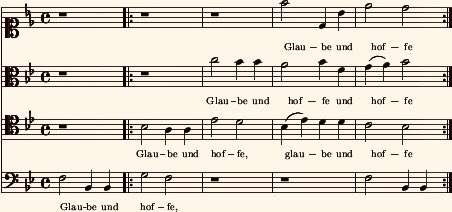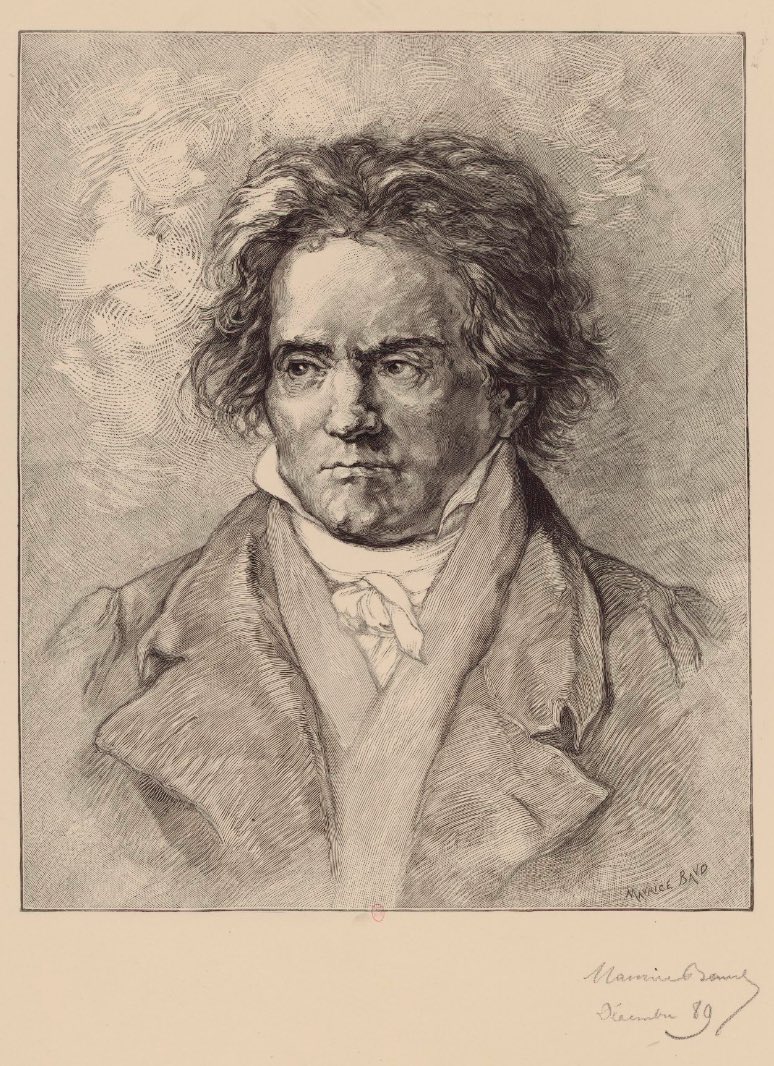
Today in the year 1770, Ludwig van Beethoven was born unto the world. I would like to offer a brief insight in this complicated man‘s personality through a few of his letters. On the one hand, Beethoven‘s music is nothing short of God-given, while on the other he was a man who... 

...routinely dismissed his servants because he thought they were spying on him and rarely shied back from driving a hard bargain with his publishers.
Now, for a few extracts, the first is part of the famous letter to the “unsterbliche Geliebte”:
Now, for a few extracts, the first is part of the famous letter to the “unsterbliche Geliebte”:
MY ANGEL! MY ALL! MY SECOND SELF!
Only a few words to-day, written with a pencil (your own). My residence cannot be settled till to-morrow. What a tiresome loss of time! Why this deep grief when necessity compels?—can our love exist without sacrifices,...
Only a few words to-day, written with a pencil (your own). My residence cannot be settled till to-morrow. What a tiresome loss of time! Why this deep grief when necessity compels?—can our love exist without sacrifices,...
...and by refraining from desiring all things? Can you alter the fact that you are not wholly mine, nor I wholly yours? Ah! contemplate the beauties of Nature, and reconcile your spirit to the inevitable. Love demands all, and has a right to do so,...
...and thus it is I feel towards you and you towards me; but you do not sufficiently remember that I must live both for you and for myself. Were we wholly united, you would feel this sorrow as little as I should. My journey was terrible.
I did not arrive here till four o'clock yesterday morning, as no horses were to be had. The drivers chose another route; but what a dreadful one it was! At the last stage I was warned not to travel through the night, and to beware of a certain wood,...
...but this only incited me to go forward, and I was wrong. The carriage broke down, owing to the execrable roads, mere deep rough country lanes, and had it not been for the postilions I must have been left by the wayside.
Esterhazy, travelling the usual road, had the same fate with eight horses, whereas I had only four. Still I felt a certain degree of pleasure, which I invariably do when I have happily surmounted any difficulty. But I must now pass from the outer to the inner man.
We shall, I trust, soon meet again; to-day I cannot impart to you all the reflections I have made, during the last few days, on my life; were our hearts closely united forever, none of these would occur to me. My heart is overflowing with all I have to say to you.
Ah! there are moments when I find that speech is actually nothing. Take courage! Continue to be ever my true and only love, my all! as I am yours. The gods must ordain what is further to be and shall be!
Your faithful
LUDWIG.
Your faithful
LUDWIG.
A little music written in Louis Spohr‘s album:
Whenever, dear Spohr, you chance to find true art and true artists, may you kindly remember
Your friend,
LUDWIG VAN BEETHOVEN.

Whenever, dear Spohr, you chance to find true art and true artists, may you kindly remember
Your friend,
LUDWIG VAN BEETHOVEN.


To Ferdinand Ries:
Berlin, July 24, 1804.
You were no doubt not a little surprised about the affair with Breuning; believe me, my dear friend, that the ebullition on my part was only an outbreak caused by many previous scenes of a disagreeable nature.
Berlin, July 24, 1804.
You were no doubt not a little surprised about the affair with Breuning; believe me, my dear friend, that the ebullition on my part was only an outbreak caused by many previous scenes of a disagreeable nature.
I have the gift of being able to conceal and to repress my susceptibility on many occasions; but if attacked at a time when I chance to be peculiarly irritable, I burst forth more violently than any one. Breuning certainly possesses many admirable qualities,...
...but he thinks himself quite faultless; whereas the very defects that he discovers in others are those which he possesses himself to the highest degree. From my childhood I have always despised his petty mind.
My powers of discrimination enabled me to foresee the result with Breuning, for our modes of thinking, acting, and feeling are entirely opposite; and yet I believed that these difficulties might be overcome, but experience has disproved this.
So now I want no more of his friendship! I have only found two friends in the world with whom I never had a misunderstanding; but what men these were! One is dead, the other still lives.
Although for nearly six years past we have seen nothing of each other, yet I know that I still hold the first place in his heart, as he does in mine. The true basis of friendship is to be found in sympathy of heart and soul.
I only wish you could have read the letter I wrote to Breuning, and his to me. No! never can he be restored to his former place in my heart. The man who could attribute to his friend so base a mode of thinking, and could himself have recourse to so base a mode of acting...
...towards him, is no longer worthy of my friendship.
Do not forget the affair of my apartments. Farewell! Do not be too much addicted to tailoring,!remember me to the fairest of the fair, and send me half a dozen needles.
Do not forget the affair of my apartments. Farewell! Do not be too much addicted to tailoring,!remember me to the fairest of the fair, and send me half a dozen needles.
I never could have believed that I could be so idle as I am here. If this be followed by a fit of industry, something worth while may be produced.
Vale! Your
BEETHOVEN
Vale! Your
BEETHOVEN
Note: in fact the friendship with Breuning lasted for a lifetime, with Stephan von Breuning dying only a mere two months after Beethoven had passed away. The two fell out after Beethoven had moved in with Breuning and discovered he had continued to pay rent for his old apartment.
He blamed Breuning for this, hence the reference in the letter to a request made with Ries of arranging different lodgings.
To Czerny:
Vienna, Feb. 12, 1816.
DEAR CZERNY,—
I cannot see you to-day, but I will call to-morrow being desirous to talk to you. I spoke out so bluntly yesterday that I much regretted it afterwards. But you must forgive this on the part of an author,...
Vienna, Feb. 12, 1816.
DEAR CZERNY,—
I cannot see you to-day, but I will call to-morrow being desirous to talk to you. I spoke out so bluntly yesterday that I much regretted it afterwards. But you must forgive this on the part of an author,...
...who would have preferred hearing his work as he wrote it, however charmingly you played it. I will, however, amply atone for this by the violoncello Sonata.
Rest assured that I cherish the greatest regard for you as an artist, and I shall always endeavor to prove this.
Your true friend,
BEETHOVEN
Your true friend,
BEETHOVEN
Czerny relates: "On one occasion, at Schuppanzigh's concert, when playing Beethoven's quintet with wind-instruments, I took the liberty, in my youthful levity, to make many alterations,—such as introducing difficulties into the passages, making use of the upper octaves, &c., &c.
Beethoven sternly and deservedly reproached me for this, in the presence of Schuppanzigh, Linke, and the other performers."
To Robert Birchall:
Vienna 14. December 1816 • 1055 Sailerstette.
DEAR SIR,—
I give you my word of honor that I have signed and delivered the receipt to the home Fries and Co. some day last August, who as they say have transmitted it to Messrs.
Vienna 14. December 1816 • 1055 Sailerstette.
DEAR SIR,—
I give you my word of honor that I have signed and delivered the receipt to the home Fries and Co. some day last August, who as they say have transmitted it to Messrs.
Coutts and Co. where you'll have the goodness to apply. Some error might have taken place that instead of Messrs. C. sending it to you they have been directed to keep it till fetched. Excuse this irregularity, but it is not my fault, nor had I ever the idea of...
...withholding it from the circumstance of the £5 not being included. Should the receipt not come forth as Messrs. C., I am ready to sign any other, and you shall have it directly with return of post.
If you find Variations--in my style--too dear at £30,...
If you find Variations--in my style--too dear at £30,...
...I will abate for the sake of your friendship one third--and you have the offer of such Variations as fixed in our former lettres for £20 each Air.
Please to publish the Symphony in A immediately--as well as the Sonata--and the Trio--they being ready here.
Please to publish the Symphony in A immediately--as well as the Sonata--and the Trio--they being ready here.
The Grand Opera Fidelio is my work. The arrangement for the Pianoforte has been published here under my care, but the score of the Opera itself is not yet published. I have given a copy of the score to Mr. Neate under the seal of friendship and...
...whom I shall direct to treat for my account in case an offer should present.
I anxiously hope your health is improving, give me leave to subscribe myself
Dear Sir
Your very obedient Serv.
LUDWIG VAN BEETHOVEN
I anxiously hope your health is improving, give me leave to subscribe myself
Dear Sir
Your very obedient Serv.
LUDWIG VAN BEETHOVEN
To Hofrath I. von Mosel (1817)
SIR,--
I sincerely rejoice that we take the same view as to the terms in use to denote the proper time in music which have descended to us from barbarous times. For example, what can be more irrational than the general term allegro,...
SIR,--
I sincerely rejoice that we take the same view as to the terms in use to denote the proper time in music which have descended to us from barbarous times. For example, what can be more irrational than the general term allegro,...
...which only means lively; and how far we often are from comprehending the real time, so that the piece itself contradicts the designation. As for the four chief movements,—which are, indeed, far from possessing the truth or accuracy of the four cardinal points,—
we readily agree to dispense with them, but it is quite another matter as to the words that indicate the character of the music; these we cannot consent to do away with, for while the time is, as it were, part and parcel of the piece,...
...the words denote the spirit in which it is conceived.
So far as I am myself concerned, I have long purposed giving up those inconsistent terms allegro, andante, adagio, and presto; and Maelzel's metronome furnishes us with the best opportunity of doing so.
So far as I am myself concerned, I have long purposed giving up those inconsistent terms allegro, andante, adagio, and presto; and Maelzel's metronome furnishes us with the best opportunity of doing so.
I here pledge myself no longer to make use of them in any of my new compositions. It is another question whether we can by this means attain the necessary universal use of the metronome. I scarcely think we shall! I make no doubt that we shall be loudly proclaimed as despots;...
...but if the cause itself were to derive benefit from this, it would at least be better than to incur the reproach of Feudalism! In our country, where music has become a national requirement, and where the use of the metronome must be enjoined on every village schoolmaster,...
...the best plan would be for Maelzel to endeavor to sell a certain number of metronomes by subscription, at the present higher prices, and as soon as the number covers his expenses, he can sell the metronomes demanded by the national requirements at so cheap a rate,...
...that we may certainly anticipate their universal use and circulation. Of course some persons must take the lead in giving an impetus to the undertaking.
You may safely rely on my doing what is in my power, and I shall be glad to hear what post you mean to assign to me in the affair.
I am, sir, with esteem, your obedient
LUDWIG VAN BEETHOVEN.
I am, sir, with esteem, your obedient
LUDWIG VAN BEETHOVEN.
To Baroness Dorothea von Ertmann:
MY DEAR AND VALUED DOROTHEA CECILIA,—
You have no doubt often misjudged me, from my apparently forbidding manner; much of this arose from circumstances, especially in earlier days, when my nature was less understood than at present.
MY DEAR AND VALUED DOROTHEA CECILIA,—
You have no doubt often misjudged me, from my apparently forbidding manner; much of this arose from circumstances, especially in earlier days, when my nature was less understood than at present.
You know the manifestations of those self-elected apostles who promote their interests by means very different from those of the true Gospel. I did not wish to be included in that number. Receive now what has been long intended for you,...
...and may it serve as a proof of my admiration of your artistic talent, and likewise of yourself! My not having heard you recently at Czerny’s was owing to indisposition, which at last appears to be giving way to returning health.
I hope soon to hear how you get on at St. Polten, and whether you still think of your admirer and friend,
L. VAN BEETHOVEN.
L. VAN BEETHOVEN.
To Schindler:
Imprimis.—Papageno, not a word of what I said about Prussia. No reliance is to be placed on it; Martin Luther's table-talk alone can be compared to it. I earnestly beg my brother also not to remove the padlock from his lips, and not to allow anything...
Imprimis.—Papageno, not a word of what I said about Prussia. No reliance is to be placed on it; Martin Luther's table-talk alone can be compared to it. I earnestly beg my brother also not to remove the padlock from his lips, and not to allow anything...
...to transpire beyond the Selchwurst-Gasse.
Finis.—Inquire of that arch-churl Diabelli when the French copy of the Sonata in C minor [Op. 111] is to be published. I stipulated to have five copies for myself, one of which is to be on fine paper,...
Finis.—Inquire of that arch-churl Diabelli when the French copy of the Sonata in C minor [Op. 111] is to be published. I stipulated to have five copies for myself, one of which is to be on fine paper,...
...for the Cardinal [Archduke Rudolph]. If he attempts any of his usual impertinence on this subject, I will sing him in person a bass aria in his warehouse which shall cause it and all the street (Graben) to ring!
Note: Schindler relates that Diabelli had refused to let Beethoven again have the MS. of the Sonata, which he had repeatedly sent for when in the hands of the engraver, in order to correct and improve it. Diabelli therefore coolly submitted to all this abuse...
...of the enraged composer, and wrote to him that he would note down the threatened bass aria, and publish it, but would give him the usual gratuity for it, and that Beethoven had better come to see him.
To the publisher Schott:
Baden, near Vienna, September 17, 1824.
The Quartet [Op. 127, in E flat major] you shall also certainly receive by the middle of October. Overburdened by work, and suffering from bad health, I really have some claim on the indulgence of others.
Baden, near Vienna, September 17, 1824.
The Quartet [Op. 127, in E flat major] you shall also certainly receive by the middle of October. Overburdened by work, and suffering from bad health, I really have some claim on the indulgence of others.
I am here entirely owing to my health, or rather to the want of it, although I already feel better. Apollo and the Muses do not yet intend me to become the prey of the bony Scytheman, as I have yet much to do for you, and much to bequeath which my spirit dictates,...
...and calls on me to complete, before I depart hence for the Elysian fields; for I feel as if I had written scarcely more than a few notes of music.
I wish your efforts all possible success in the service of art; it is that and science alone which point the way, and lead us to hope for a higher life. I will write again soon.
In haste, your obedient
BEETHOVEN.
In haste, your obedient
BEETHOVEN.
All translations of the German originals by lady Grace Wallace (1866)
• • •
Missing some Tweet in this thread? You can try to
force a refresh










